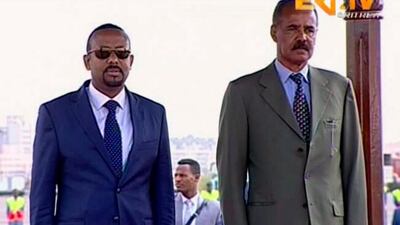Ethiopia and Eritrea formally restored relations on Monday, ending 20 years of enmity, with an agreement signed by their leaders in the Eritrean capital Asmara.
Ethiopian Prime Minister Abiy Ahmed and Eritrean President Isaias Afwerki signed a "Joint Declaration of Peace and Friendship", Eritrean Information Minister Yemane Gebremeskel said on Twitter.
The statement declared that the "state of war that existed between the two countries has come to an end. A new era of peace and friendship has been ushered (in)."
"Both countries will work to promote close cooperation in political, economic, social, cultural and security areas," Mr Yemane said.
Images of the ceremony showed the two men sharing a wooden desk, backed by their national flags, as they simultaneously signed the document.
The declaration echoed comments made by Mr Abiy at a dinner hosted by Mr Isaias on Sunday, where he said diplomatic, trade, transport and communications ties would be re-established and borders re-opened.
"We agreed that the airlines will start operating, the ports will be accessible, people can move between the two countries and the embassies will be opened," Mr Abiy said.
"We will demolish the wall and, with love, build a bridge between the two countries," he said.
United Nations Secretary General Antonio Guterres hailed the peace process as "a very important symbol of hope not only for the two countries, not only for Africa but for the whole world".
"It is obvious that it's now for the two parties to decide how they want to conduct the solution of their problems, but the UN will be entirely at their disposal to do whatever is necessary to faciliate the success of what needs to be done and mainly related to questions related to the borders," he said during a visit to Addis Ababa.
Recent weeks of rapid rapprochement are aimed at ending decades of animosity, periods of outright conflict and many years of cold war between the two countries.
The UAE welcomed welcomed the restoration of diplomatic ties and pledged to help the two nations achieve peace and security.
"The re-establishment of diplomatic ties will have a positive impact on the security and stability of the two countries in particular, and the Horn of Africa in general," Sheikh Abdullah bin Zayed, the Minister of Foreign Affairs and International Co-operation, said in a statement released on Wam, the state news agency .
"The UAE supports sound international relations that seek to promote peace and prosperity, with respect for international law. The UAE will support the two countries based on these foundational principles for the interest of the two countries, their peoples, and the region as a whole," Sheikh Abdullah said.
______________
Read more:
Ethiopia's new Prime Minister isn't afraid to shake things up
UAE pledges Dh11 billion in economic aid to Ethiopia
______________
The thaw began last month when Mr Abiy said Ethiopia would abide by a 2002 UN-backed ruling, made after a two-year frontier war, and hand back disputed border territory, including the flashpoint town of Badme, to Eritrea.
The re-establishment of diplomatic and trade ties after years of bitter separation could mean big benefits for both nations, and the wider Horn of Africa region, plagued by conflict and poverty.
Once a province of Ethiopia that comprised its entire coastline on the Red Sea, Eritrea voted to leave in 1993 after a decades-long, bloody independence struggle.
The break rendered Ethiopia landlocked, and the deterioration of relations due to the continuing cold war forced Ethiopia to rely on Djibouti for its sea trade.
Ethiopian access to Eritrea's ports will be an economic boon for both, as well as posing a challenge to the increasing dominance of Djibouti which had benefited from importing and exporting the vast majority of goods to Africa's second-most populous country.
Free movement across the border will also unite, once again, two peoples closely linked by history, language and ethnicity.
Ethiopia's Foreign Minister Workneh Gebeyehu said Monday that joint commissions on economics, politics and military cooperation would be set up to "work out the exact time and place of the implementation plan".
Regional leaders also welcomed the peace efforts, with Rwanda's President Paul Kagame telling Mr Abiy and Mr Isaias: "We congratulate you and are with you," in a statement on Twitter.
Kenya's President Uhuru Kenyatta also congratulated the two leaders for, "choosing the path of talking to each other and beginning the journey of friendship".
Since taking office in April, Mr Abiy has driven whirlwind reforms reversing some of the touchstone policies of the ruling Ethiopian People's Revolutionary Democratic Front (EPRDF).
He has released prominent dissidents from jail, announced the partial liberalisation of the economy, admitted the security forces use torture and pursued peace with Eritrea.
Eritrea, nation of about 5.1 million people, is one of the most isolated countries in the world and has been led by Mr Afwerki since 1991.
Residents of the countries wasted no time in phoning each other.
"Received the first call from Asmara in Eritrea!" exclaimed Ermiyas Teklu in Ethiopia, after speaking to his uncle and his family after more than two decades when telecommunications between the neighboring countries were blocked. "The last time I talked to them was when I was in a third country. My mother is going to talk to our relatives in Eritrea and everyone is excited about it."
Many Ethiopians expressed their exhilaration on social media and changed their profile pictures to a photo of the Ethiopian and Eritrean leaders embracing Sunday after Mr Abiy arrived in Asmara.
"The events of these past two days between Ethiopia and Eritrea are like the fall of the Berlin Wall. Only amplified 1,000 times . physical structures were the only things between us. We were never separated in spirit," Samson Haileyesus wrote on Facebook.

